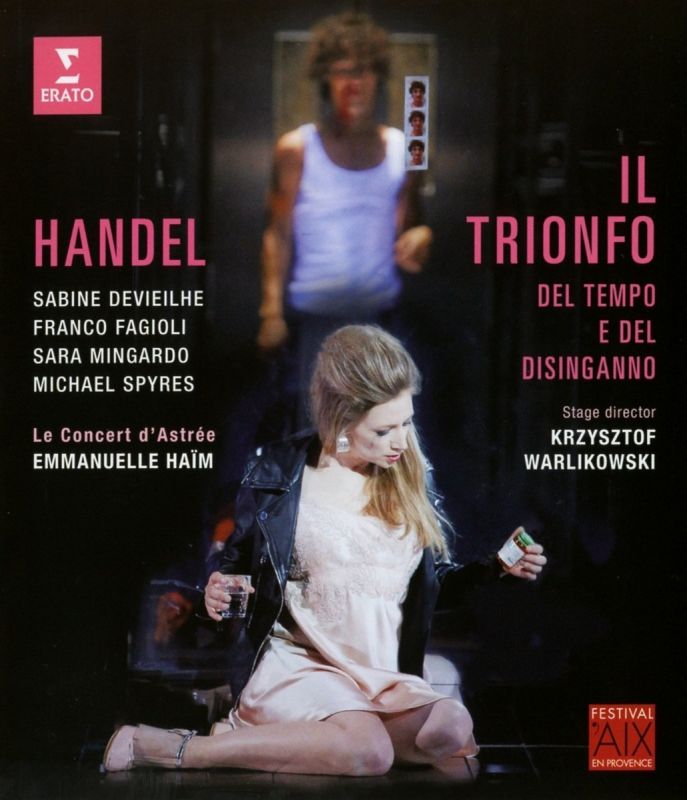HANDEL Il Trionfo del Tempo e del Disinganno
View record and artist detailsRecord and Artist Details
Composer or Director: George Frideric Handel
Genre:
Vocal
Label: Erato
Magazine Review Date: 09/2017
Media Format: CD or Download
Media Runtime: 138
Mastering:
DDD
Catalogue Number: 9029 581929

Tracks:
| Composition | Artist Credit |
|---|---|
| (Il) Trionfo del Tempo e del Disinganno |
George Frideric Handel, Composer
(Le) Concert d'Astrée Emmanuelle Haïm, Conductor Franco Fagioli, Piacere, Countertenor George Frideric Handel, Composer Michael Spyres, Tempo, Tenor Sabine Devieilhe, Bellezza, Soprano Sara Mingardo, Disinganno, Contralto |
Author: David Vickers
None of the moral that godly virtue is preferable to carnal selfishness survives in Krzysztof Warlikowski’s rigidly subversive staged production (filmed last summer at the Aix-en-Provence Festival). Sabine Devieilhe’s mentally ill Bellezza, her unnamed dancing boyfriend and Franco Fagioli’s greasy, thrill-seeking Piacere have been raving it up in a bisexual threesome at a dodgy nightclub when they take some dodgy pills; the anonymous lover dies from the overdose, Bellezza recovers only physically from her bad trip but is emotionally and psychologically fragile, whereas Piacere seems to get over the ordeal in his stride; Bellezza’s abusive sex-pest father Tempo (more than a whiff of hypocrisy in Michael Spyres’s dislikeable manner) and long-suffering mother Disinganno (Sara Mingardo) attempt to persuade their prodigal daughter to give up the wild life and return to the fold – most of this unfolds before the end of the Sinfonia. During the production it becomes apparent that Tempo and Disinganno are more corrupt, damaged and darker than the fun-loving Piacere, whose secularised honesty transforms him into the anti-moral hero. Needless to say, Bellezza’s eventual choice in favour of moral rectitude is depicted as the unhinged despair of a vulnerable and deeply traumatised young woman, who commits suicide in order to escape from the conflicts around her (and her inner demons); in her closing aria ‘Tu del ciel ministro eletto’ she slits her wrists and bleeds to death. All of the above leaves a bitter aftertaste that cuts against the grain of the work’s poetic and musical meaning, and the experience is predictably convoluted, clumsy, crass and joyless.
Emmanuelle Haïm’s musical direction is hampered by many of the same drawbacks evident in her audio recording of the oratorio (Virgin, 2007): fast tempos are too rushed, slow tempos drag lugubriously, the rhetorical nature of some arias is misconceived, over-exaggerated playing diminishes Le Concert d’Astrée’s effectiveness and organ continuo intrudes too much. Moreover, five numbers are cut and the interval is positioned in the wrong place. Sabine Devieilhe is blessed with a phenomenal instrument and Sara Mingardo’s mature artistry has the benefit of considerable experience in this repertoire. Franco Fagioli’s contorted vowels, singing fractionally behind the beat, and one-dimensional velocity in quick music are not my idea of Pleasure (his creamy ‘Lascia la spina’ is lovelier, although the indulgent slow pacing fails to convey the musical material’s distinctly different function from its later reinvention as ‘Lascia ch’io pianga’ in Rinaldo). Michael Spyres’s mostly loud delivery and clumsy ornamentation grates. Indeed, the majority of singers’ embellishments are unstylish premeditations that lack spontaneity and are often ruinous recompositions inferior to Handel’s notated guidelines: Bellezza’s final scene is merely decorous rather than profoundly truthful.
Discover the world's largest classical music catalogue with Presto Music.

Gramophone Digital Club
- Digital Edition
- Digital Archive
- Reviews Database
- Full website access
From £8.75 / month
Subscribe
Gramophone Full Club
- Print Edition
- Digital Edition
- Digital Archive
- Reviews Database
- Full website access
From £11.00 / month
Subscribe
If you are a library, university or other organisation that would be interested in an institutional subscription to Gramophone please click here for further information.




